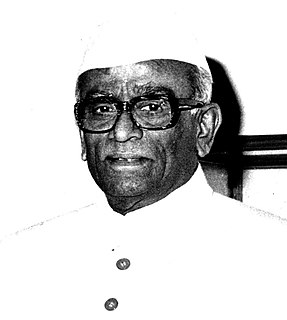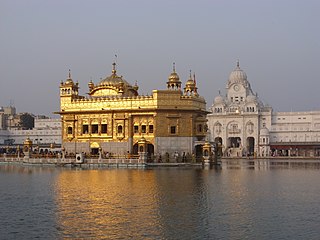
Neelam Sanjiva Reddypronunciation (help·info) was the sixth President of India, serving from 1977 to 1982. Beginning a long political career with the Indian National Congress Party in the Indian independence movement, he went on to hold several key offices in independent India—as the first Chief Minister of Andhra Pradesh, a two-time Speaker of the Lok Sabha and a Union Minister—before becoming the youngest-ever Indian president.
Malwa is the region of Punjab that lies to the south of Majha, separated by the Satluj river, and to the north and west of Poadh.
Politics in reorganised present-day Punjab is dominated by mainly two parties. One is Shiromani Akali Dal(Badal) and the other is Indian National Congress. Since 1967, Chief Minister of Punjab has been predominantly from Jat Sikh community despite its 21 percent state population. Only exception was Giani Zail Singh, the Chief Minister of Punjab from 17 March 1972 to 30 April 1977 belonging to Other Backward Class community that has population of 31.3 percent. However Scheduled Castes (Dalit) community never had Chief Minister from community or proper representation in Government, despite having 32 percent population in the state. Other prominent party is Bahujan Samaj Party especially in Doaba region. In 1992 BSP won 9 seats Vidhan Sabha elections. Also BSP won 3 lok sabha seats from Punjab in 1996 general elections and only Garhshanker seat in 1997 Vidhan Sabha elections. Communist parties too have some influence in the Malwa area. In the 2014 general elections, the first-time contesting Aam Aadmi Party got 4 out of 13 seats in Punjab by winning 34 of the total 117 assembly segments, coming second in 7, third in 73 and fourth in the rest 3 segments. The support for the Aam Aadmi Party increased later in Punjab. The current Government was elected in the 2017 Punjab Assembly elections and the Congress won 77 out of 117 Assembly seats with Captain Amarinder Singh as the current Chief Minister. The AAP, fighting its first assembly election in the state, won 20 seats. The incumbent BJP-SAD alliance came third with 18 seats.

Sikhism is the fourth largest religion in India and has existed for 549 years, beginning with the birth of its founder Guru Nanak. The Sikhs are predominantly located in Punjab, but also in many other parts of India. It is also the fifth largest religion in the world, with more than 27 million followers in the world as of the year 2010.

The Election Commission of India held indirect 13th presidential elections of India on 19 July 2007. Pratibha Patil with 638,116 votes won over her nearest rival Bhairon Singh Shekhawat who got 331,306 votes. This result meant that Pratibha Patil became the first female President of India.

General elections were held in India in 1989 to elect the members of the 9th Lok Sabha. V. P. Singh united the entire disparate spectrum of parties including regional parties such as the Telugu Desam Party, the Dravida Munnetra Kazhagam, and the Asom Gana Parishad, forming the National Front with N.T.Rama Rao as President and V. P. Singh as convenor with additional outside support from the Bharatiya Janata Party and Communist Party of India (Marxist) led Left front they defeated Rajiv Gandhi's Congress (I) in the 1989 parliamentary elections.

The Election Commission of India held indirect 9th presidential elections of India on July 1987. R. Venkataraman with 740,148 votes won over his nearest rival V. R. Krishna Iyer who got 281,550 votes.
The Election Commission of India held indirect 6th presidential elections of India on August 17, 1974. Fakhruddin Ali Ahmed, from Assam with 765,587 votes won over his nearest rival Tridib Chaudhuri, from West Bengal who got 189,196 votes.

The Election Commission of India held indirect 5th presidential elections of India on August 1969. Varahagiri Venkata Giri with 420,077 votes won in a runoff election over his rival Neelam Sanjeeva Reddy who got 405,427 votes.
The Election Commission of India held the indirect 4th presidential elections of India on May 6, 1967. Dr. Zakir Husain, with 471,244 votes, won the presidency over his rival Koka Subba Rao, who garnered 363,971 votes.
The Election Commission of India held indirect 3rd presidential elections of India on May 7, 1962. Dr. Sarvepalli Radhakrishnan with 553,067 votes won the presidency over his rivals Chowdhry Hari Ram who got 6,341 votes and Yamuna Prasad Trisulia who got 3,537 votes.

The Election Commission of India held indirect 2nd presidential elections of India on May 6, 1957. Dr. Rajendra Prasad won his re-election with 459,698 votes over his rivals Chowdhry Hari Ram who got 2,672 votes and Nagendra Narayan Das who got 2,000 votes. Rajendra Prasad, has been the only person, to have won and served two terms, as President of India.

The Election Commission of India held the first presidential elections of India on May 2, 1952. Dr. Rajendra Prasad won his first election with 507,400 votes (83.81%) over his nearest rival K. T. Shah who got 92,827 votes (15.3%).

The 1984 anti-Sikh riots, also known as the 1984 Sikh Massacre, was a series of organised pogroms against Sikhs in India in response to the assassination of Indira Gandhi by her Sikh bodyguards. The then ruling party, Indian National Congress had been in active complicity with the mob, as to the organisation of the riots. Independent sources estimate the number of deaths at about 8,000–17,000 whilst government estimates project that about 2,800 Sikhs were killed in Delhi.

The 14th indirect presidential election, in order to elect the 13th president, was held in India on 19 July 2012. The last date for filing nominations was 30 June, whereas the votes would be counted on 22 July. The two leading candidates for the presidency were former Finance Minister Pranab Mukherjee from West Bengal and former Speaker of the Lok Sabha Purno Agitok Sangma from Meghalaya.
The elections in 2012 were scheduled for seven Vidhan Sabhas and several local elections were also conducted. The 14th presidential election to elect the 13th president of the republic was also held in 2012. The tenure of the legislative assemblies of Goa, Gujarat, Himachal Pradesh, Manipur, Punjab, Uttar Pradesh and Uttarakhand were to expire during the year. The Election Commission of India issued the dates for the elections in Manipur, Punjab, Uttarakhand, Uttar Pradesh and Goa to take place in the first quarter of the year. Whereas the elections were held in Himachal Pradesh and Gujarat in the last quarter of the year.

Indira Gandhi was sworn in as Prime Minister of India for the third time on 14 January 1980.

The Shiromani Akali Dal (SAD) is a political party in India. There are a large number of parties with the name "Shiromani Akali Dal". The party recognised as "Shiromani Akali Dal" by the Election Commission of India is the one led by Sukhbir Singh Badal. It controls Sikh religious bodies Shiromani Gurudwara Prabandhak Committee, Delhi Sikh Gurdwara Management Committee and is the largest and most influential Sikh political party worldwide. The basic philosophy of Akali Dal is to give a political voice to Sikh issues and it believes that religion and politics go hand in hand. Shiromani Akali Dal is part of the BJP led NDA.

A Legislative Assembly election was held in the Indian state of Punjab on 4 February 2017 to elect the 117 members of the Punjab Legislative Assembly. The counting of votes was done on 11 March 2017. The ruling pre-election coalition was the alliance comprising the political parties Shiromani Akali Dal and Bharatiya Janata Party and led by Chief Minister Parkash Singh Badal. The voter turnout for the Punjab Assembly election was 76.83%. The Indian National Congress led by former Chief Minister Captain Amarinder Singh defeated the ruling alliance and the newcomer Aam Aadmi Party.
















